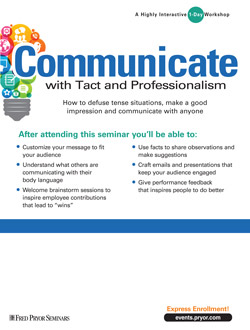Gracious Response – How to Receive Performance Feedback
You probably know one or more people who do not take kindly to receiving feedback on what they can do better. Maybe you’re one of those. Take heart—most of us are!
Many people do not like the idea of being told what they’re not doing well. It’s like someone saying you’re wrong. You probably don’t like that, neither do I. The difference between people who are seen as coachable and those who are perceived as not, lies primarily in how they respond to such feedback.
I once had a colleague who was always quick to volunteer for tasks and commit to deadlines for the completion of those tasks. But most of the time, he didn’t deliver on his promises. Over a period of about 15 months, some of the commitments he made (and didn’t deliver on) affected me, mostly because I had to pick up the slack. So I decided to speak to him about it.
I called him into a private meeting, and told him how much I loved his enthusiasm for getting things done, but wondered if he was taking on too many things at the same time. I gave him three instances over the previous year that he was not able to deliver by the deadlines that he committed to, without even trying to re-negotiate those deadlines. I explained how this could affect his credibility as a person and that people could easily misjudge his intention as a result of his actions. While he thanked me for taking the time to discuss this with him, I could tell that he didn’t like what just happened.
During the half-hour discussion, he used the phrase, “I take an exception to that” at least twice. He also asked me what right I had to come to him with “accusations” that had no basis. I wasn’t his boss, and had no motive for telling him what I observed, other than the concern for the damage to his reputation. Because of his reaction, I decided I would never again give him any kind of constructive feedback.
That’s the main reason I decided long ago to receive such feedback politely. I have blind spots, and I’d like people to tell me what they see that I’m not seeing. I don’t want to do anything that will stop that flow of potentially useful advice.
Here are three approaches I’ve found helpful.
- Don’t be Defensive. Resist the temptation to be defensive or offer justifications, even if that’s how you feel. It can be difficult to receive negative feedback without being defensive. I’m guilty of that sometimes. As humans, we don’t like someone telling us what we’re not doing well. It bruises our egos. And that’s true even when we already know that we have opportunities to improve in those areas.
- Go on the Offensive. Early in my career as a young engineer, I was one of those who responded very poorly to receiving negative feedback. Much later, I saw that the advice I was receiving was to my benefit. I realized that those giving me the feedback were not doing it just to frustrate me or make me mad. They were doing it in my best interests! To take the sting out, I would ask them to tell me what they thought I wasn’t doing well, and also for ideas on getting better. And because I asked for it, the stings from the feedback became less and less painful.
- Thank them! No matter how ridiculous the feedback seems to you, or how angry you are, thank the person for having the courage to speak up, even if they’re obliged to— as in the case of a boss. This is especially true if they’re not in a position of authority over you. Let them know how much you appreciate the fact that they have your best interests at heart. Take a few days to think about what they say, and if necessary, approach them later to ask clarifying questions. As you do, you are demonstrating that you are coachable, and willing to listen.
Remind yourself that the goal of the feedback is to make you better. Learn to listen and internalize what you hear before responding. If you become defensive or attack them, you’ll be cutting off the flow of valued and useful inputs that could help you grow. Respond with grace and humility.









